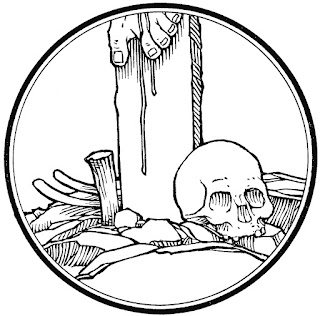In a Bible Class a week or so ago, we were discussing the Judge, Jephthah. Jephthah had made a vow to the Lord before heading into battle against the enemies who had been oppressing Israel. Jephthah vowed, “If you will give the Ammonites into my hand, then whatever comes out from the doors of my house to meet me when I return in peace from the Ammonites shall be the Lord's, and I will offer it up for a burnt offering” (Judges 11:31-32).
Jephthah was probably convinced that the first thing to run out of his house would have been a goat, a sheep, or an ox which was finally set free from the stall. Instead, it was his daughter. While the Bible is rather discreet in describing what happened, it seems certain that Jephthah offered up his only daughter as a human sacrifice.
The astounding part of keeping this vow is that it forced Jephthah to do what God calls an abomination in his eyes. So, the question is raised: Why did Jephthah keep the vow to do what violated God's word? Why didn't he renege? Wouldn't God have preferred violating a vow to avoid a human sacrifice?
This is not the only incident where something like this happened. When the Israelites were entering the Promised Land, the Lord told them to make treaties with no people in that land. They could make treaties with distant nations, but not with locals. The people from Gibeon, locals, feared the slaughter that would come if they faced Israel. So, they disguised themselves, presented themselves as foreign nationals, and forged a treaty with Israel. Even though the Gibeonites lied, the people of Israel honored their covenant.
From the book of Joshua: "Joshua summoned them, and he said to them, 'Why did you deceive us, saying, "We are very far from you," when you dwell among us? Now therefore you are cursed, and some of you shall never be anything but servants, cutters of wood and drawers of water for the house of my God.' ... So he did this to them and delivered them out of the hand of the people of Israel, and they did not kill them" (Johsua 9:22-23,26). Once again, the people of Israel defied God's instructions for the sake of keeping their vow. Why didn't they excuse themselves because the Gibeonites lied?
Perhaps someone has a better answer than I do, but here are my thoughts. When God chooses to deal with us, he deals with us in words. God is always faithful to his word. Of course, God does not make foolish vows, but God never reneges on his words, either. If that is how God regards words, he expects us to be careful with our words because we are bound to keep them. The vows we make should be vows that we are in control of keeping, such as a marriage vow, a vow to tell the truth in a witness stand, confirmation vows, ordination vows, etc. We should not be careless or frivolous with vows, especially when we can do nothing to guarantee them.
That is why Jesus instructed us, “Again you have heard that it was said to those of old, ‘You shall not swear falsely, but shall perform to the Lord what you have sworn.’ But I say to you, Do not take an oath at all, either by heaven, for it is the throne of God, or by the earth, for it is his footstool, or by Jerusalem, for it is the city of the great King. And do not take an oath by your head, for you cannot make one hair white or black. Let what you say be simply ‘Yes’ or ‘No’; anything more than this comes from evil" (Matthew 5:33-37).
God takes words very seriously, especially vows. With vows, we are calling on God to hold us to our word. God does not take lightly our invoking of his name--whether specifically stated or implied. After all, who else holds you accountable when you swear? Since God always is faithful to his word, he holds us accountable for ours. Apparently, the people of Israel would rather be found faithful to their words than to avoid the evil which resulted from foolish vows. And while the Bible does not comment on God's reaction, it seems that God expected words and vows to be kept, regardless of the cost.
.tif)
.tif)

%20(Lu%206.27-42).tif)
.tif)




.tif)
.tif)


%20(Mk%208.27-38).tif)


